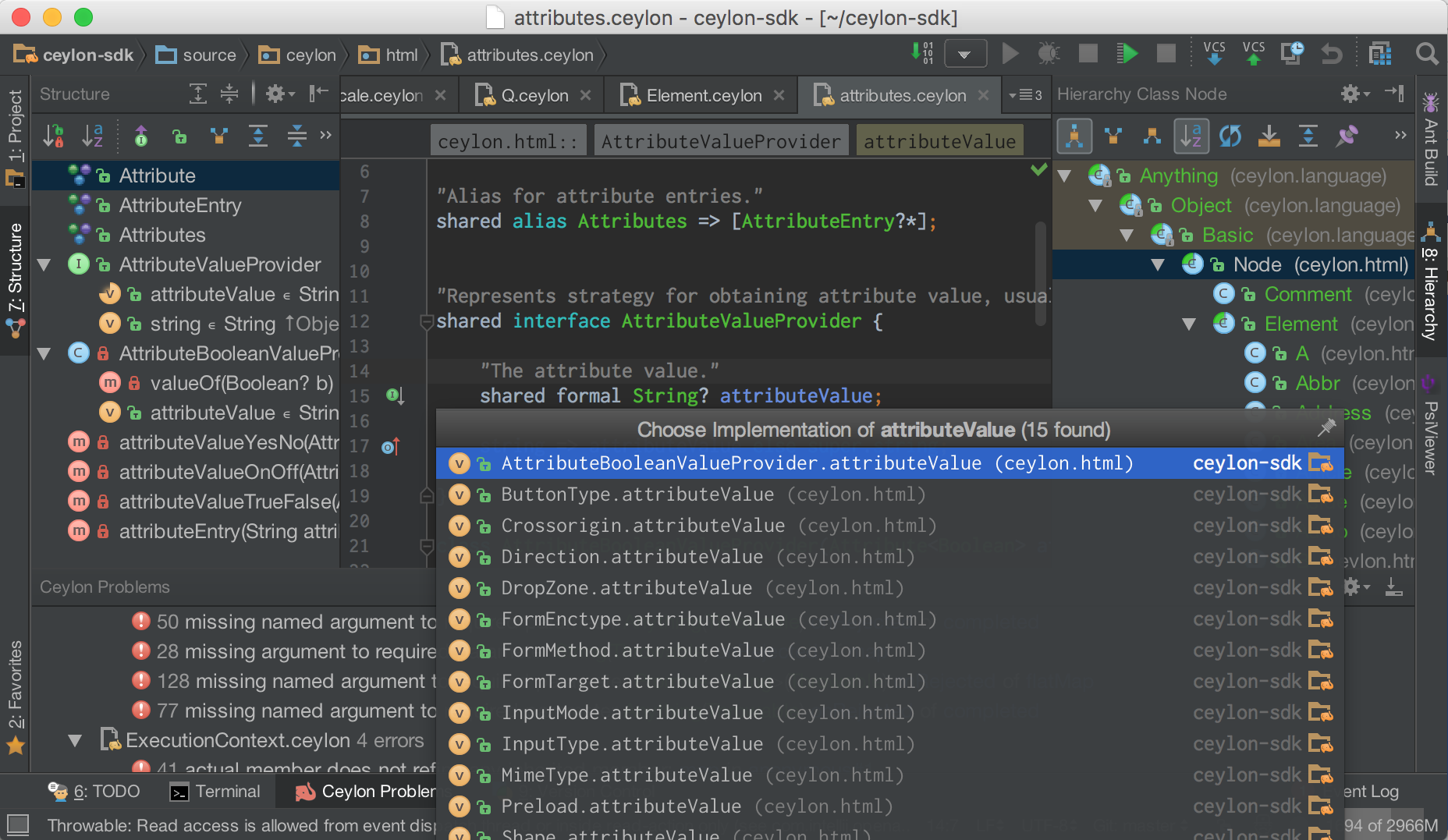Ceylon 1.3.0 is now available
Ceylon 1.3.0 is a major release of the Ceylon language, with over 330 issues closed. This is the first release of Ceylon which supports Android development, the Node Package Manager (npm), and Wildfly Swarm.
- For the JVM, this release is backwards-compatible with all releases of Ceylon 1.2 (1.2.0 to 1.2.2).
- For JavaScript, this release is backwards-compatible only with the previous release (1.2.2).
Ceylon IDE 1.3.0 is now available for the two leading Java development environments:
- for the very first time, as a plugin for IntelliJ IDEA and Android Studio, alongside
- existing support for the Eclipse platform.

Ceylon IDE for IntelliJ was designed for high performance in large projects with many Java dependencies, and is currently the best-performing IDE for Ceylon.
Changes
Enhancements to the language and command-line distribution include:
- support for developing Android applications
- support for importing modules from npm and for publishing Ceylon modules to npm
- support for developing microservices with WildFly Swarm
- cross-platform services, abstracting the Java service loader
- addition of the
fat-jartool for packaging a Ceylon program and its dependencies into a single assembly - much slimmer runtime
- destructuring for parameters of anonymous functions
- destructuring in
cases of aswitch - addition of the
CorrespondenceMutatorinterface - addition of
Collection.combinations() smallandsinceannotations- many minor improvements to interoperation with Java
- experimental support for Java APT processors
- improved behavior for
istests with generic Java types - correct typing for things annotated
@Nullable/@NotNullin Java - full support for Java 8
- reduced typechecker memory footprint
Naturally, the release incorporates many more bugfixes, minor enhancements, and performance improvements.
Support for Docker
Docker images for Ceylon are now available, making it very easy to run Ceylon programs in a Docker container.
IDE Changes
Ceylon IDE for IntelliJ is a brand-new development tool for IntelliJ IDEA and Android Studio, featuring incremental error reporting, code completion, basic refactoring, many intention actions, sophisticated navigation, searching, type hierarchy and file structure, online documentation, full integration with Ceylon Herd and much, much more.
Ceylon IDE for IntelliJ is written mostly in Ceylon, and reuses the Ceylon IDE Common project, the core of Ceylon IDE for Eclipse, which was completely rewritten in Ceylon.
Almost 60 issues were fixed in Ceylon IDE for Eclipse, and code completion was redesigned around a non-blocking approach which is much more responsive in large projects. In addition, improvements to the typechecker have resulted in significantly lower memory usage.
SDK Changes
Exactly 40 issues affecting the Ceylon SDK have been fixed.
Migration from Ceylon 1.2.2
Ceylon 1.3.0 is backward-compatible with Ceylon 1.2.2, and so it’s not necessary to recompile or change dependencies. However, upgrading to version 1.3.0 of any Ceylon platform module is recommended.
About Ceylon
Ceylon is a modern, modular, statically typed programming language for the Java and JavaScript virtual machines. The language features a flexible and very readable syntax, a unique and uncommonly elegant static type system, a powerful module architecture, and excellent tooling, including an awesome IDE supporting both IntelliJ IDEA and the Eclipse platform.
Ceylon enables the development of cross-platform modules that execute portably in both virtual machine environments. Alternatively, a Ceylon module may target one or the other platform, in which case it may interoperate with native code written for that platform.
In the box
This release includes:
- a complete language specification that defines the syntax and semantics of Ceylon in language accessible to the professional developer,
- a command line toolset including compilers for Java and JavaScript, a documentation compiler, a test runner, a WAR archive packager, a “fat” JAR packager, and support for executing modular programs on the JVM and Node.js,
- a powerful module architecture for code organization, dependency management, and module isolation at runtime, which also supports interoperation with OSGi, Jigsaw, Maven, and npm, and
- the language module, our minimal, cross-platform, foundation-level API.
Available separately:
- updated versions of the platform modules that comprise the Ceylon SDK,
- a code formatter as a plugin for the
ceyloncommand, - a plugin for the
ceyloncommand that supports compilation and execution for the Dart VM, and - two full-featured integrated development environments: for Eclipse and IntelliJ IDEA.
Language
Ceylon is a highly understandable object-oriented language with static typing. The language features:
- an emphasis upon readability and a strong bias toward omission or elimination of potentially-harmful or potentially-ambiguous constructs and toward highly disciplined use of static types,
- an extremely powerful and uncommonly elegant type system combining subtype and parametric polymorphism with:
- first-class union and intersection types,
- both declaration-site and use-site variance, and
- the use of principal types for local type inference and flow-sensitive typing,
- a unique treatment of function and tuple types, enabling powerful abstractions, along with the most elegant approach to
nullof any modern language, - first-class constructs for defining modules and dependencies between modules,
- a very flexible syntax including comprehensions and support for expressing tree-like structures,
- fully-reified generic types, on both the JVM and JavaScript virtual machines, and a unique typesafe metamodel.
More information about these language features may be found in the feature list and quick introduction.
Community
The Ceylon community site, https://ceylon-lang.org, includes documentation, and information about getting involved.
Source code
GitHub.
Information about Ceylon’s open source licenses is available here.
Issues
Bugs and suggestions may be reported in GitHub’s issue tracker.
| Reference: | Ceylon 1.3.0 is now available from our JCG partner Gavin King at the Ceylon Team blog blog. |


